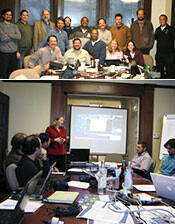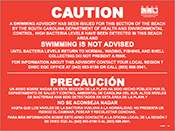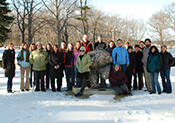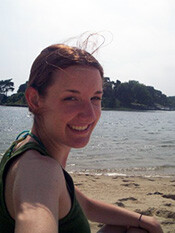Science of Marine Managed Areas
 Continuing work with Conservation International's Marine Management Area Science (MMAS) program, Bill Dennison, Tim Carruthers, Caroline Wicks, and Jane Thomas from IAN and Ecocheck attended workshops in Boston in December 2009 and January 2010. IAN staff worked with the lead scientists from the different project components, summarizing results from the node field sites in Panama, Brazil, Fiji, and Belize. The outcomes of the workshops were drafts of synthesis products from the MMAS program: (1) 'Ecological monitoring', which will be a four-page policy brief summarizing monitoring of coral reefs at the node sites; (2) 'Living with the Seas', which will be a booklet summarizing the ecological effects and implications of marine managed areas; and (3) 'Community Health Index', which will be a booklet on the development of a health assessment tool for coral reefs.
Continuing work with Conservation International's Marine Management Area Science (MMAS) program, Bill Dennison, Tim Carruthers, Caroline Wicks, and Jane Thomas from IAN and Ecocheck attended workshops in Boston in December 2009 and January 2010. IAN staff worked with the lead scientists from the different project components, summarizing results from the node field sites in Panama, Brazil, Fiji, and Belize. The outcomes of the workshops were drafts of synthesis products from the MMAS program: (1) 'Ecological monitoring', which will be a four-page policy brief summarizing monitoring of coral reefs at the node sites; (2) 'Living with the Seas', which will be a booklet summarizing the ecological effects and implications of marine managed areas; and (3) 'Community Health Index', which will be a booklet on the development of a health assessment tool for coral reefs.
Beach bacteria models integrate remote sensing and IOOS data to protect public health
 EcoCheck is developing daily forecasts for bacteria conditions at several beaches in the Myrtle Beach area of South Carolina that are impacted by stormwater. Working with partners at the South Carolina Department of Health and Environmental Control (SCDHEC), the University of South Carolina, and the South East Coast Ocean Observing Region Association (SECOORA), EcoCheck is creating updated models by integrating data from state beach program sampling data, remote sensing, and Integrated Ocean Observing System (IOOS) buoy data. These data can improve model predictions and create the potential for forecasting several days in advance. Models are developed to alert program staff to conditions that are likely to result in high bacteria counts and therefore warrant issuance of an advisory to beachgoers. This project is developing data management and processing tools to allow transfer of the approach to other beaches on the Atlantic coast.
EcoCheck is developing daily forecasts for bacteria conditions at several beaches in the Myrtle Beach area of South Carolina that are impacted by stormwater. Working with partners at the South Carolina Department of Health and Environmental Control (SCDHEC), the University of South Carolina, and the South East Coast Ocean Observing Region Association (SECOORA), EcoCheck is creating updated models by integrating data from state beach program sampling data, remote sensing, and Integrated Ocean Observing System (IOOS) buoy data. These data can improve model predictions and create the potential for forecasting several days in advance. Models are developed to alert program staff to conditions that are likely to result in high bacteria counts and therefore warrant issuance of an advisory to beachgoers. This project is developing data management and processing tools to allow transfer of the approach to other beaches on the Atlantic coast.
Science communication course at the University of New England
 On January 12–13, Science Communicators Joanna Woerner and Emily Nauman presented a Science Communication course at the University of New England in Biddeford, Maine. Twenty-two professionals from organizations such as The University of New England, Wells Reserve, Maine Drinking Water Program, Maine Department of Environmental Protection, and Maine NEMO Program explored how to synthesize data in conceptual diagrams, presentations, and print documents. Participants left the course with drafts of science communication products describing a variety of topics including threats to drinking water, benefits of vegetated buffers, endangered species management, and household pollutant minimization. We look forward to seeing how they continue their outreach and communication efforts.
On January 12–13, Science Communicators Joanna Woerner and Emily Nauman presented a Science Communication course at the University of New England in Biddeford, Maine. Twenty-two professionals from organizations such as The University of New England, Wells Reserve, Maine Drinking Water Program, Maine Department of Environmental Protection, and Maine NEMO Program explored how to synthesize data in conceptual diagrams, presentations, and print documents. Participants left the course with drafts of science communication products describing a variety of topics including threats to drinking water, benefits of vegetated buffers, endangered species management, and household pollutant minimization. We look forward to seeing how they continue their outreach and communication efforts.
New EcoCheck intern - Christine Thurber
 Christine has joined EcoCheck as a Science Communication Intern. She recently graduated from Assumption College in Worcester, MA, studying biology and environmental science. Christine worked with wetland scientists for two years at an integrated services engineering firm and also volunteered as a water quality monitor through the Blackstone Valley River Coalition. After graduation she spent the summer studying harmful algal blooms at Horn Point Lab and Gallaudet University. It was through the Maryland Sea Grant Research Experience for Undergraduates at Horn Point that she learned about IAN. In the fall, Christine interned for the U.S. Fish and Wildlife Service Patuxent Research Refuge, conducting environmental education for the public. She has a wide range of interests in biology and environmental science, and is utilizing this internship to determine a course of study for graduate school. She loves photography, writing, hiking, camping, kayaking, and rock climbing, as well as recreational volleyball and frisbee.
Christine has joined EcoCheck as a Science Communication Intern. She recently graduated from Assumption College in Worcester, MA, studying biology and environmental science. Christine worked with wetland scientists for two years at an integrated services engineering firm and also volunteered as a water quality monitor through the Blackstone Valley River Coalition. After graduation she spent the summer studying harmful algal blooms at Horn Point Lab and Gallaudet University. It was through the Maryland Sea Grant Research Experience for Undergraduates at Horn Point that she learned about IAN. In the fall, Christine interned for the U.S. Fish and Wildlife Service Patuxent Research Refuge, conducting environmental education for the public. She has a wide range of interests in biology and environmental science, and is utilizing this internship to determine a course of study for graduate school. She loves photography, writing, hiking, camping, kayaking, and rock climbing, as well as recreational volleyball and frisbee.